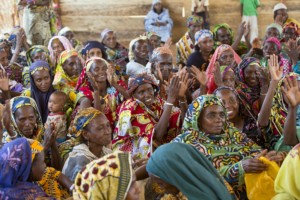Digital Skills Training in Cameroon: Employment and Poverty
 Unemployment is a root cause of poverty worldwide, stripping individuals and families of the financial means to secure necessities. Unemployment perpetuates a cycle of poverty, where a lack of income limits opportunities for education, health care and economic mobility. For women, especially in developing countries like Cameroon, these challenges are compounded by systemic inequalities, including overrepresentation in informal jobs lacking protections like sick leave and safety nets against global economic shocks.
Unemployment is a root cause of poverty worldwide, stripping individuals and families of the financial means to secure necessities. Unemployment perpetuates a cycle of poverty, where a lack of income limits opportunities for education, health care and economic mobility. For women, especially in developing countries like Cameroon, these challenges are compounded by systemic inequalities, including overrepresentation in informal jobs lacking protections like sick leave and safety nets against global economic shocks.
Unemployment, Women and Poverty in Cameroon
Globally, the COVID-19 pandemic exacerbated unemployment, with women disproportionately affected due to caregiving responsibilities and job losses in sectors with high female participation. In 2020, the equivalent of 255 million full-time jobs were lost. This has particularly affected women, those in informal employment and those in developing nations. In Cameroon, women’s labor force participation has declined over the decades and they face a higher unemployment rate of 6.1% compared to 3.8% for men.
More than 80.5% of employed women are in vulnerable positions compared to 64% of men, meaning their work lacks the protections to shield them from economic shocks. Such systematic disparities heighten the risk of poverty for women in Cameroon. Limited access to education and societal biases further compound their challenges, narrowing their pathways to stable, high-quality employment.
Digital Skills Training in Cameroon: The Benefits
The digital economy offers a transformative opportunity to address unemployment and poverty among women in Cameroon. New pathways open up for secure employment in growing sectors like digital marketing, web development, content creation and data analysis by equipping women with digital skills. Unlike informal jobs, digital professions often provide flexible conditions, opportunities for self-employment and higher income security.
These jobs empower women economically and contribute to broader economic growth by tapping into an underutilized segment of the workforce. In Cameroon, the digital economy has steadily grown, contributing 3.5% to the gross domestic product (GDP) in 2016, with even more tremendous potential for the future. However, women currently represent only 20% of digital workers, highlighting the need for targeted initiatives to bridge this gap.
Data Girl Technologies: Driving Change
Organizations like Data Girl Technologies are pivotal in this transformation. Dedicated to empowering women through digital skills training in Cameroon, Data Girl Technologies provides education and mentorship tailored to young African women. Through hands-on workshops and practical training, participants gain job-ready skills in programming, website design and digital marketing.
Data Girl Technologies creates pathways to overcome unemployment and vulnerable work by equipping women with these skills. These efforts enable women to achieve financial independence, pursue entrepreneurial ventures and contribute meaningfully to Cameroon’s economic growth.
Digital Training: A Catalyst for Poverty Reduction
Addressing unemployment among women through digital skills training in Cameroon has a cascading effect on poverty reduction. Digital professions reduce women’s vulnerability to economic shocks by providing access to secure, high-quality jobs. At the same time, the inclusion of women in the digital workforce fuels broader economic development, creating a virtuous cycle that benefits communities and the nation as a whole.
As policymakers and organizations like Data Girl Technologies continue to invest in women’s digital education, they are addressing immediate employment challenges and laying the groundwork for long-term poverty eradication. By closing the gender gap in digital professions, Cameroon can unlock the full potential of its workforce, ensuring a more inclusive and prosperous future.
– Sarah Maunsell
Sarah is based in Bristol, UK and focuses on Good News for The Borgen Project.
Photo: Flickr
